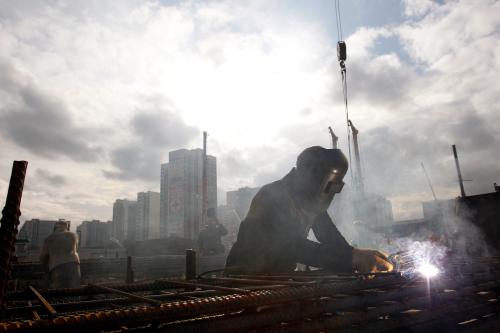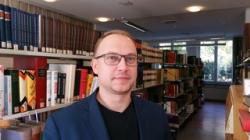Post-Soviet countries are in the spotlight again, given the current tragedy involving Russia and Ukraine. We study one episode in the common Soviet past—the political repressions under Joseph Stalin’s rule. The system of forced prison labor camps (gulags) in the former Soviet Union (FSU) is mostly associated with Joseph Stalin’s rule (1929-1953). It was the epitome of harshness and repression and led to the coercion to penal labor of millions of men, women, and children in camps scattered throughout the former Soviet Union (Figure 1). The Soviets criminalized aspects of economic and social life, such as tardiness and minor workplace mistakes. People could be arrested, sentenced in a mock trial, and sent to a camp for stealing bread, having anti-Soviet thoughts, being well-off peasants, and failing to report any suspicious activity. About a quarter to a third of gulag prisoners were criminals who had committed crimes, such as murder, rape, or robberies. The rest were Soviet citizens of all walks of life.
About 20 million people were inmates in gulag camps and some more than once. The camps mostly closed after 1953, though some continued in operation until the 1980s, and some were refurbished into regular prisons. Old barracks, buildings, or memorials often remain as reminders of the repressive past.
The Soviet repressions during Stalin’s rule persist in collective memory. In surveys, 80 percent of Russians say they know about Stalin’s repressions. Over one-third of Russians report having relatives who experienced repressions during Stalin.
But did these far-reaching political repressions leave a long-lasting mark on society? In a new research paper, recently published in the Journal of Public Economics, we zoom in on this dark episode of history and study whether it explains differences in trust and civic engagement within the countries that once formed the former Soviet Union.
Figure 1. Geographic distribution of forced labor camps in the former Soviet Union, 1923-1960
Source: Nikolova, Popova, and Otrachshenko (2022).
Living near a former gulag made political repression more salient and visible to local communities and increased the costs of trusting others. Those living near gulag communities at the time could gather information about the extent of the terror, which likely had a long-term scarring effect. The memories of released relatives or former prisoners who settled locally and interactions with gulag prisoners who worked alongside free laborers or roamed across towns made the repressions and their consequences tangible for bystanders. As a result, gulag contemporaries living near a campsite likely developed mistrust, which persisted in the community over time. This was especially because the Soviets encouraged citizens to mistrust and tell on one another. Keeping one’s head down and mistrusting others was an essential survival strategy in this environment.
While the repressions took place all over the Soviet Union, the proximity to the camps and the visibility of the extent and scope of punishment it brought likely made the fear, caution, and mistrust of others stronger and more tangible for those living near camps compared to those living further away. This social norm of mistrust persisted and was transmitted in the community over time.
We test the extent to which trust differences in the FSU countries are attributable to past political repression by combining contemporary individual-level data from the Life in Transition Survey with information on the geolocation of 474 former gulag camps. The latter information comes from the German and Russian websites of Memorial—an international nongovernmental organization working to preserve the history of political repression in the FSU.
We show that living close to a former gulag—an active symbol of past repression—increases the probability of reporting complete distrust from 14 percent to 17 percent and some distrust from 22 percent to 25 percent. This is important because a lack of trust is detrimental to the economy. Furthermore, trust is a marker of the quality of the social fabric and underpins social and economic interactions within society.
Living near a former camp also reduces present-day civic engagement by lowering the likelihood of voting from 77 percent to 73 percent, being an active party member from 6 percent to 3 percent, and socializing with family and friends from 79 percent to 75 percent. While they seem small, these effects are meaningful since they have persisted for over half a century.
Figure 2. Proximity to former gulag camps and present-day trust levels, average adjusted predictions, with 95% confidence intervals
Source: Nikolova, Popova, and Otrachshenko (2022).
Note: The figure shows the average adjusted probabilities for each category of generalized trust, which is measured using the question, “Generally speaking, would you say that most people can be trusted, or you can’t be too careful in dealing with people?”
Figure 3. Proximity to former gulag camps and present-day trust levels and social capital, average marginal effects with 95% confidence intervals
Source: Nikolova, Popova, and Otrachshenko (2022).
Notes: The figure shows the effect of living within 10 km of a former gulag on the predicted probability of reporting each action. 77.12 percent of the analysis sample reported having voted in the previous election. 6.12 percent of respondents are current party members. 78.49 percent of respondents visit their friends and family at least monthly. 10.67 percent of respondents are active members of at least one civic group. 7.47 percent of respondents participated in at least one of these actions.
Past political repression further translates into mistrusting institutions such as police, courts, and the local authorities. A coincidence? Hardly. These institutions carried out Stalin’s repressions at the time.
Furthermore, we show that living near former gulag sites also increases the mistrust of neighbors. These results fit with the historical evidence that Soviet authorities relied on neighbors spying on one another and willingly or unwillingly coming up with lists of potential “enemies of the people.” In the Soviet Union, multiple families often shared communal apartments where neighbors could overhear conversations. Parents taught their children to be wary of their neighbors because “the walls have ears.” While many Soviet citizens were suspicious of their neighbors and had the perception that the informants to the authorities were many, our results imply that the proximity to forced labor camps made the mistrust of neighbors more salient.
Our results suggest that past political repression, epitomized by places of forced labor, bred persistent social and institutional mistrust and low civic engagement. In addition to the scarring effect, we consider alternative explanations. For example, a possible alternative explanation is that the gulag locations coincide with the places where Stalin’s victims were arrested. Additional analyses reveal that our results are independent of proximity to the places where the victims of repressions were arrested. This result suggests that gulag locations are the main symbol of Stalin’s political repression and a major factor shaping today’s collective memory and trust outcomes.
Our findings imply that Stalin’s terror created a wide-ranging change in social norms, including trust norms, which persisted for over half a century. The lesson from history is that past political repression can have long-lasting negative consequences in terms of eroding trust and civic engagement. Unfortunately, political repression and illiberal regimes are not a thing of the past, both in post-Soviet countries and globally. For example, many FSU countries are among the least free and democratic countries. Our research provides concrete evidence that repressive regimes erode the future quality of the social fabric, in addition to the suffering they cause in the short run.













Commentary
Past political repression creates long-lasting mistrust
March 2, 2022